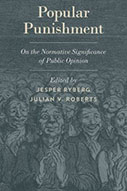Popular Punishment: On the Normative Significance of Public Opinion

Eds: Jesper Ryberg and Julian Roberts
Publisher: Oxford University Press, 2014
Reviewer: Matthew B. Kugler | November 2014
Much research over the last two decades has asked how public opinion can and does influence criminalization and sentencing decisions. More research has used the presumption that public opinion matters as a justification for researching public views on criminal justice issues both large and small. Some of my own prior work, and that of my graduate mentor John Darley, falls into that category. This book instead asks the normative question: should the public be involved in punishment decision making and, if so, how?
Ryberg and Roberts assembled an impressive team of scholars to offer their perspectives on the issue. More important to the quality of the final product than the authors’ resumes, however, is that many of the scholars actively engage with each other’s arguments. Many edited volumes read like a series of disconnected papers. This one contains several integrated exchanges. Jan W. de Keijser’s methodological critique of informed sample studies is an extremely useful counterpoint to Paul Robinson’s defense of the coherence of public opinion. Matt Matravers’s general piece on the advantages of relying on lay beliefs versus expert judgments nicely complements Richard Lippke’s discussion of democratic accountability versus elite professionalism among prosecutors. And Roberts’ own concluding chapter provides both an excellent thematic summary of the main points raised throughout the volume and a useful scorecard for the various exchanges.
To the extent the book as a whole has a problem, it is that the various authors do not always frame their work in terms of the common underlying themes. Each author necessarily has to take positions on the quality of public opinion, the relationship of public opinion to elite opinion or scientific authority, democratic political theory, and the costs and benefits of ignoring public opinion in favor of some other decision making authority. The volume is at its best when it is clear where the authors consciously disagree on these points, and it is less good when the authors plainly do disagree but talk around each other.
It is worth beginning with a consideration of the empirical perspective, as many of the authors build their arguments based on the work reviewed by Robinson, de Keijser, and Roberts in their chapters. There is now a wealth of data showing that – particularly in Anglophone countries – most of the public believes that judges are insufficiently punitive toward criminal defendants as a general matter. There is also a wealth of data showing that this effect is substantially diminished if members of the public are given the details of specific cases rather than being asked their general views, and that giving policy-level information reduces it further. These are the informed sample studies referenced above. Finally, there are any number of studies showing that members of the public are fairly good at drawing fine-grained distinctions between different types of crimes and different variants of an individual crime, with high consistency from person to person on whether crime A is worse than crime B. For example, participants drew highly reliable distinctions between thirteen variants of bicycle theft in one of my studies with Stuart Green. Excepting victimless crimes and crimes of self-defense, this type of ordinal consistency holds up well even across cultures. Similar work has shown consistent judgments of the severity of different kinds of punishments, equating prison durations and fines to terms of community service.
A question running through many of the pieces is whether the above level of coherence and sophistication is good enough to serve as a guideline to criminal justice policy. Paul Robinson believes that it is, focusing heavily on the ordinal consistency that he and others have observed in their empirical work. He also points to a danger of ignoring public opinion: several scholars have shown in laboratory settings that telling participants about sentencing outcomes that offend their senses of justice causes them to lose respect for the justice system and makes them less inclined to cooperate with it.
There are two critiques of this position. One, offered by de Keijser, is that the entire enterprise of trying to promote legitimacy by relying on informed community opinion is self-defeating. After all, the great masses of the people will be uninformed, and they will still disagree with the result. So the legitimacy gains suggested by Robinson may prove chimerical. And, for obvious reasons, few would advocate relying on uninformed opinion given how markedly it differs. De Keijser also argues, fairly persuasively, that it is unclear that the public wants to be involved in sentencing decisions. It may even, on an abstract level, actually prefer to leave sentencing decisions in the hands of an impartial judge.
Others, such as Roberts, do not believe that Robinson has conclusively demonstrated the legitimacy effect. I am inclined to agree with this perspective. The general public appears to be quite bad at converting their highly reliable ordinal rankings and blameworthiness judgments into actual sentences. In the aforementioned theft study, for example, the median sentence assigned across scenarios ranged from less than a week to twelve and a half years. Participants’ ordinal rankings were beautifully consistent, but even the law student participants in that study did not know where to start when left to simply write a number on a page. When presented with an actual sentence, I would imagine that people would be inclined to accept a fairly wide range of punishments as legitimate because, to them, there is no clear starting point. Most studies showing a strong effect of disagreement on legitimacy are using cases where the law imposes either no punishment or an extremely harsh one while most people are inclined to do the exact opposite. There is reason to doubt that such effects could be generalized to cases where the difference is a mere factor of two or three.
Several authors in the volume question whether public opinion adds meaningful information to the opinions and conclusions of experts. Mirko Bagaric’s essay, for example, takes a strong position against using public opinion to inform sentencing proportionality judgments. According to Bagaric, sentencing is an important social institution with objectives that have been set by empirical and normative inquiry. Except as a means for determining the well-being cost of particular crimes, public opinion should not play a part in the sentencing inquiry. Frej Thompson endorses a similar argument. Given the cognitive biases that affect people’s judgments of such emotionally charged and cognitively complex events, he argues, there is no reason to think that the collective judgment of a great mass of people will not have systematic errors. And systematic errors persist through aggregation rather than neatly cancelling out. Polling the public on sentencing is, in this view, as sensible as polling them on medical treatments.
Jesper Ryberg’s introductory piece presents a nice contrast to that perspective. Ryberg argues that much of underlying penal theory – the foundation on which Bagaric and Thompson’s experts rely – is itself informed by public intuitions. This disagreement hints at a major theme implicit in several of the pieces: whether the judgment of elites is different than that of the public because elites are smarter, more informed, and less biased, or because elites have different values and life experiences. To the extent that elites are merely the public as it should be, then it is foolish to, in the words of Thompson, double count public opinion by adding it to elite judgment. It is far better to rely on the cleaner judgment of elites than to dilute it with lower quality input. But what if elites are different because of their values and life experiences? Then there is always the possibility that the elites are wrong and the masses are right. There is also the possibility that there is no clearly defined right technocratic answer that does not rely on debatable normative assumptions. After all, is there a normatively correct ratio of guilty men going free versus innocent men convicted, or is that a matter of societal moral judgment? Christopher Bennett’s excellent piece also expounds on these themes and presents an interesting discussion of when expert judgment is likely to be superior to mass judgment and vice versa. His own specific proposal – a sentencing jury – is interesting in itself, but his broader discussion of democratic accountability and the ability of members of the lay public to serve a truth-finding deliberative function is also very valuable.
The final chapters in the volume propose specific changes to the justice system. In his essay, Richard Lippke not only asks whether prosecutors should be elected officials of bureaucratic experts (as its title would suggest), but also engages more deeply with questions about the proper role of the polity in a democratic system of criminal justice. Rule by Platonic philosopher kings would be all well and good, but throughout the volume the authors implicitly assume that they are describing a justice system in a democracy. Therefore, some decisions, funding levels if nothing else, really do have to be decided through quasi-majoritarian channels. The real question is not whether the public should have any say in the justice system, but rather how far its reach should go. Lippke himself draws out arguments for and against allowing the public to define the bounds of the criminal code itself as well as allowing the public input into sentencing decisions within the code. The distinction is, in effect, between setting the goals of the justice system and determining the specific means to achieve those goals. Bennett deals with very similar themes, if coming down more firmly on the side of some lay involvement in the process.
Thom Brooks and Albert Dzur close the volume by unabashedly calling for more involvement of the public, if not public opinion, in criminal sentencing. Brooks argues for an extension of the restorative justice model that he terms “stakeholder sentencing.” The basic idea is that those with a stake in sentencing – the victim, their close connections, the immediate community – have a moral right to have a say in penal outcomes. As an expansion of the restorative justice model, Brooks proposes several interesting new ideas that will likely spark further debate in the future. His stated goal in this process is Robinsonian in that he wants to increase public involvement as a way of bolstering public confidence in the justice system. Recalling de Keisjer’s critique, however, it is not necessarily clear that the public needs such a bolstering of confidence, or that this is the best way of achieving it. But even if the legitimacy of the justice system is not in need of shoring up, the proposal remains an interesting one.
Dzur wants to involve the public because he believes the current Rube Goldberg structure of the justice system has the effect of making no one responsible for the atheoretical mess that is the American penal system. Even apart from his central argument, the essay is interesting for its refreshing reminder that the current American justice system is neither the expert-driven utopia of Bargaric or the citizen-driven democracy of Robinson. Given the major impact that the justice system can have on individual lives, Dzur believes that there is a moral requirement that citizens be involved in decision making roles. He imagines “ontologically thick” engagement of citizens in the justice system, something far beyond the opinion-of-the-minute approach taken in deliberative polling or even traditional jury service.
This volume is a great read for academics of all stripes who are interested in criminal justice issues. The diversity of perspectives offered by the authors allows it to serve as a handy reference for those new to the debate, and the quality of the scholarship should not disappoint those who have previously encountered the work of one or more of the authors.
Matthew Kugler: PhD in Psychology, Princeton University, 2010; J.D. University of Chicago Law School, expected 2015.


